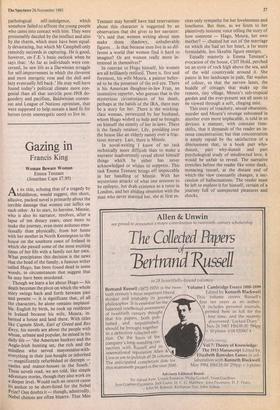Gazing in
Francis King
Woman Beware Woman Emma Tennant (Jonathan Cape £7.95)
As its title, echoing that of a tragedy by Middleton, would suggest, this short, allusive, packed novel is primarily about the terrible damage that women can inflict on each other. At its start, its heroine, Minnie, who is also its narrator, resolves, after a lapse of ten dreary years, once more to make the journey, even more arduous emo- tionally than physically, from her home with her mother in North Kensington to the house on the southern coast of Ireland in which she passed some of the most exciting times of her life with a family not her own. What precipitates this decision is the news that the head of the family, a famous writer called Hugo, has been found dead in some Woods, in circumstances that suggest that he may have been murdered.
Though we learn a lot about Hugo — his death becomes the pivot on which the whole story swings back and forth between past and present — it is significant that, of all the characters, he alone remains implausi- ble. English by birth, he took up residence in Ireland because his wife, Moura, in- herited a house and land there. With titles like Captain Sloth, Earl of Greed and Rex Envy, his novels are about the people with Whom, urbane and popular, he mixed in his daily life — 'the American bankers and the Anglo-lrish hunting set, the rich and the mindless who served mayonnaise-with- everything in their just-bought or inherited — magnificently refurbished or decrepit castles and manor-houses in the South.' These novels read, we are told, like simple adventure stories, though they also work on a deeper level. Would such an oeuvre cause its author to be short-listed for the Nobel Prize? One doubts it — though, admittedly, Nobel choices are often bizarre. That Miss
Tennant may herself have had reservations about this character is suggested by an observation that she gives to her narrator: 'It's said that women writing about men make them shadowy, unbelievable figures... Is that because men live in so dif- ferent a world that women find it hard to imagine? Or are women really more in- terested in themselves?'
In contrast to Hugo himself, his women are all brilliantly realised. There is, first and foremost, his wife Moura, a painter believ- ed to be the possessor of the evil eye. There is his American daughter-in-law Fran, an insensitive reporter, who guesses that in the mysterious circumstances of his death, perhaps at the hands of the IRA, there may be a story for her. There is the working- class woman, persecuted by her husband, whom Hugo wished to help and so brought on himself the enmity of her in-laws. There is the family retainer, Lily, presiding over the house like an elderly nanny over a frac- tious nursery. Last, there is Minnie.
In novel-writing I know of no task technically more difficult than to make a narrator inadvertently reveal about himself things which he either has never acknowledged or wishes to suppress. This task Emma Tennant brings off impeccably in her handling of Minnie. With her mysterious attacks of what one assumes to be epilepsy, her drab existence as a tutor in London, and her abiding obsession with the man who never married her, she at first ex-
cites only sympathy for her lovelessness and loneliness. But then, as we listen to her plaintively insistent voice telling the story of how someone — Hugo, Moura, her own mother? — cheated her out of the marriage on which she had set her heart, a far more formidable, less likeable figure emerges.
Equally masterly is Emma Tennant's evocation of the house, Cliff Hold, perched on an eyrie of rock high above the sea, and of the wild countryside around it. She paints in her landscape in pale, flat washes of colour, so that the narrow lanes, the huddle of cottages that make up the remote, tiny village, Moura's sub-tropical garden and the ever-present sea all seem to be viewed through a soft, clinging mist.
This story of treachery, sexual obsession, murder and Moura's revenge subsumed in another even more implacable, is told in so devious a manner, with constant time- shifts, that it demands of the reader an in- tense concentration; but that concentration is amply repaid by the satisfaction of a denouement that, in a book part who- dunnit, part why-dunnit and part psychological study of misdirected love, it would be unfair to reveal. The narrative stretches before the reader like some dank, menacing tunnel, at the distant end of which, the view constantly changes, a suc- cession of hallucinations. The reader must be left to explore it for himself, certain of a journey full of unexpected pleasures and shocks.














































 Previous page
Previous page